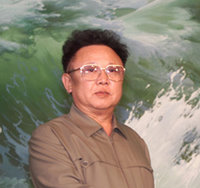The last few months have witnessed a resurgence in expert chatter on the possible demise of Kim Jong Il's rule in North Korea. Growing evidence of regime frailty has focused attention on potential scenarios of endgame dynamics, most of which feature some combination of Kim striking out against the West, and China being forced to step in to prevent the dreaded refugee flow north. But while the nuclear issue remains a driver of Western policy toward North Korea, China's current focus seems less ideological than predatory. Like a mafia don "busting out" a victimized business partner, Beijing now seems mainly intent on exploiting Kim's distress to empty North Korea of its remaining valuables before the place gets torched.
The list of indicators pointing to regime failure in North Korea has lengthened dramatically in recent months. Kim Jong Il's 2008 stroke set in motion a frantic government effort to publicly anoint his shadowy, 20-something third son, Kim Jong Un, as his successor. To that end, the heir apparent is promising -- rather fantastically -- to make North Korea a "mighty and prosperous nation" by 2012, the centennial of national founder Kim Sung Il's birth. Meanwhile, the kleptocratic regime is decidedly short of cash since the United Nations clamped down on its arms-sales business, and recently had to back off from a draconian revaluation of its currency when the normally beaten-down public flashed some serious anger in reply -- an embarrassing and unprecedented setback for the truly totalitarian system.
Then there's the return of starvation in the countryside, where farmers routinely see the bulk of the harvest carted off by the all-powerful military to feed itself, leaving the locals to survive on whatever scraps are left over. When North Korea last suffered an extended famine in the mid-1990s, soon after Kim Jong Il assumed power, more than 10 percent of the population (or 2.5 million to 3 million people) died -- and that's according to the regime itself. With South Korea having ended its "sunshine policy" -- and, with it, generous food aid -- two years ago, more of Kim's undernourished subjects have been forced into illegal market activities to survive, risking lengthy imprisonment or death in the regime's vast network of political prisons cum labor camps.

